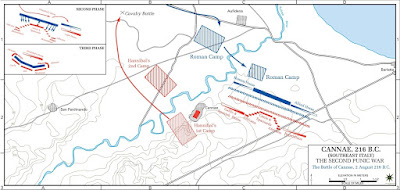Proximō annō Hannibal, ubi cōpiās dūxit ex hībernīs, iter
Cannās fēcit et castra prope oppidum posuit. Posteā, quia Rōmānī cōpiās contrā
Poenōs dūcēbant, Hannibal Gallōs et Hispānōs in cornū laevō locāvit, Numidās in
cornū dextrō, agmen medium cum peditibus tenuit. Poenī Rōmānōs magnā cum caede
superant, multōs necant aut vulnerant aut capiunt. Magnus est timor inter
Rōmānōs. Sed Hannibal mīlitēs nōn contrā Rōmam, sed Capuam dūxit. Mora Poenōrum
oppidum servāvit.
cornū, -ūs [4/n]: (here) the wing
of an army
hībernum, -ī [2/n]: winter;
(here) in plural: winter quarters
Cannās [accusative plural] │ to
Cannae; Cannae is a plural noun; when expressing movement to a town, the
accusative alone is used without a preposition. Similarly: Athēnās [accusative
plural of Athēnae] │ to Athens
___________________
The next year Hannibal, when he had led the troops from
(their) winter quarters, marched to Cannae and placed a camp [encamped] near
the town. Afterwards, because the Romans were leading troops against the
Carthaginians, Hannibal placed the Gauls and the Spaniards in the left column /
wing, the Numidians in the right column / wing, and held the middle column with
the infantry. The Carthaginians overcome / overcame the Romans with great
slaughter, they kill(ed) or wound(ed) or capture(d) many [killing or wounding
or capturing many]. There is / was great fear among the Romans. But Hannibal
led the soliders not against Rome, but (against) Capua. The delay of the
Carthaginians saved the town.
____________________
https://en.wikipedia.org/wiki/Battle_of_Cannae
https://www.britannica.com/event/Battle-of-Cannae
“Cannae is the greatest ambush in
ancient history”



No comments:
Post a Comment